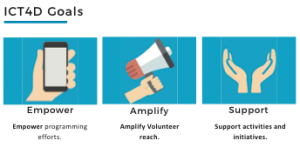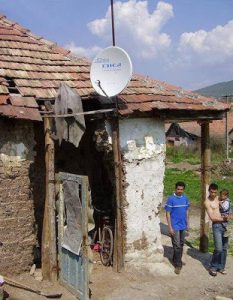The traditional one-to-one relation between development and economic growth has given way to a more holistic understanding of the term that encompasses social, environmental and economic wellbeing. Among other theories, Kleine’s approach proffers the idea of development as the freedom of choice – personal, social, economic and political – which a person may value most. In this context, ICT4D work as invaluable catalyzers for human advancement to help people achieve different ‘degrees of empowerment’ regarding choice capabilities. Needless to say, the volunteering sector has been at the cutting edge of ICTs in their strife to ameliorate community life conditions, taking into consideration their impact on the quality and quantity outcomes of volunteering agency.

For this reason, many governmental and non-governmental organizations have placed great emphasis on the implementation and dissemination of ICTs inside their own institution, and of course, in their humanitarian enterprises. Take US Peace Corps, its 2017 ICT4D Playbook has been conceived as a guide for US Peace Corps staff and volunteers on Information and Communication Technologies for Development. Beyond the Peace Corps’ political agenda, the guide provides an instructive overview of how ICT4D enables volunteers to carry out their missions. Indeed, technological breakthroughs have helped the volunteering industry to have a positive impact and achieve what this organization identifies as ICT4D Goals – Empower, Amplify and Support – with the purpose of bridging the digital divide in developing communities.

According to the guide, the implementation of ICTs has been facilitated by (1) the improvements in the information landscape which have made it possible connectivity and the use of mobile devices even in the remotest environments, (2) the volunteers’ familiarity and dependence on technology, (3) the high demand for technological projects among the local counterparts, and (4) the drive for social and cultural integration which ICTs may well materialize while contributing to the people’s participatory aspirations.
“Development is a process of expanding the real freedoms that people enjoy (Amartya Sen, 1999)”
Thus, the spreading and general usage of ICTs has brought about undeniable advantages for the institutions and their legion of volunteers…, but what about the people whose lives are intended to improve? Back to Kleine’s paper, the asymmetric access to technology in terms of availability, affordability and ICT literacy influence the outcomes which hinge on local specificities and, more often than not, on the political environment. To put it simply, the digital divide…, upon which I would not like to concentrate the focus, though.
Certainly, over the last thirty years, we have attended to an accelerated competition for new technologies where everything has become digital and the only truth is associated with virtual reliability, which comes to the paradox of ‘virtual’ truth. Nonetheless, even when this hope and hype for ICTs could bolster social and political processes, at the end of the day, ICTs are only an ingredient of the development recipe and excessive accent on ICT4D should be avoided (see page 11). What is more, development failures are frequently a consequence of an approach too centered on ICT4D instead of focusing on more comprehensive structural changes (to learn more, read page 9)

As an eye-opening example, the picture above shows us how, in so-claimed developed Europe, there are pockets of poverty regardless of the widespread access to technological breakthroughs. Likewise, a brief visit to those massive slums in the Global South will discover similar images of ‘well-connected’ needy households where the only dignifying issue for the youth, deprived of opportunities for self-realization but aware of a different reality, will be the dehumanizing migration to the North.
In fact, this story has been already told. The rural exodus in developing Spain, thirty years ago, is partially on the back of an over-emphasis on road infrastructures aimed at improving the communication between a more disadvantaged countryside and the almost developed urban areas… However, once the transport network was ameliorated, the lack of other social facilities in the villages resulted in a final trip to the cities after which the population remained there.
Hence, I cannot help but to align myself with Freire’s liberating approach to development as a participatory process in which, there is an incontestable need for ‘conscientisation’ pursuing constant transformation through critical reflection upon social reality (see here), which goes beyond acquiring technical capabilities.
“We are transformative beings and not beings for accommodation (Paulo Freire, 1992)”
Having said that, ICTs should never be the ultimate goal but the means to weave a tighter social fabric. By doing this, not only do volunteers amplify their reach but also empower people and make their voices matter in decisions who affect their lives. Once more, the white savior complex is not the best approach to foster social change, ICT may well support activities and community initiatives but taking into consideration the points of view of those who know best.
Still, I prefer to see the world through rose-colored spectacles and enjoying technological accomplishments such as the enlightening Mexican struggle for education during the Covid19 Pandemic…, there are plenty of fields where the contribution of ICT4D to human progress will be crucial in the coming years, from risk assessment and early warning systems to the classical education and health operative schemes.
To conclude, I would like to keep your chins up. So, I leave you this link, watch it because we are not lost yet!





